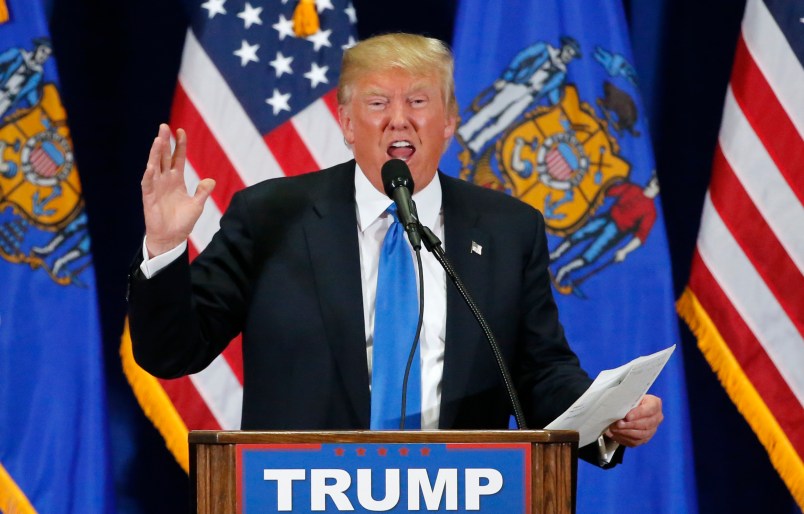It is, or should be, a general rule of thumb that top industry CEOs often have no better understanding of fiscal policy or macro-economics than the average man or woman on the street. But the CEO often thinks she does, which is the problem. In a sense, this shouldn’t surprise us. A good CEO knows his business and industry inside and out. He might also know various policies that could facilitate the growth of individual businesses. But the entire economy, macro-economics, fiscal policy, currency policies – none of that is just a really big business, certainly not a really big business in your industry. It is a qualitatively different thing altogether. But we often don’t get that. CEOs definitely tend not to get it. Again, this should be a rule of thumb – not because business leaders know nothing about national economic policy but because they don’t tend to know much more than other comparably educated people, only they think they do.
This definitely applies to Donald Trump, though it’s questionable whether he counts as a ‘top CEO’. But he’s clearly in a different category altogether. We can start to see an integrated web of foreign policy thinking coming into focus, with discussions of debt policy, trade and growth policy and foreign policies.
A couple weeks ago, I read a really good piece (I can’t remember the author – perhaps someone can remind me … here it is) on how Trump thinks the economy and the global economy works on ‘deals’. That’s obviously true in the sense that many trade agreements are endlessly negotiated to address the needs of all parties. But sustainable trade deals create mutually beneficially rules frameworks in which private commerce can operate by efficiencies and supply and demand and all the other factors by which capitalist economies function. When you have a ‘bad’ deal it’s seldom because one or the other party got hoodwinked (after all you can always scrap the deal) it’s because it’s written to benefit only certain economic actors in each country.
Rules are the key. Is it pure laissez-faire? Or a framework of minimum worker and environmental rights which allow the workers to benefit with business and to reduce some of the extreme disparities between advanced and developing economies?
Trump’s view of ‘deals’ comes from the often predatory world of the Manhattan real estate market, where the sharks often do ‘win’ in absolute terms, sticking other parties with ‘deals’ where they win and the other guy loses. This has all come into sharper relief as Trump has started talking about a withdrawal from various US foreign alliances in Europe and Asia. If you look closely, he’s not really talking about pulling out, he’s talking about demanding what amounts to protection money payments from these countries for US security security protections, payments he seems to think end up helping pay off the national debt.
So Japan, you want a great power protector from a rising China? What’s it worth to you? You and Germany are going to need to pay up maybe $100 billion a year for protection and also to cover whatever trade deficits you’re running with us. This is to put it mildly a way of thinking about national economic policy and foreign policy that is fundamentally geared to rent-seeking, poorly functioning markets, ones geared to force and non-mutually beneficial trade. This also seems to be Trump’s mode of extracting wall building money from Mexico, getting some sort of cash payment in exchange for the current trade deficit.
Just so we’re clear: It is a very legitimate debate over whether the US can continue to fund what amounts to the world’s only dominant military force, when other countries are becoming wealthier every day. It’s also a legitimate question whether increased trade liberalization are smart for the US. But coming to goo decisions on those questions is an altogether different matter from the bluff and bluster, bully tactics that Trump proposes to bring to the world stage.
There are plenty of downsides to this kind of thinking. But a chief one is that it fundamentally fails to understand the economic realities of the 21st century. US economic clout, by most measures, is clearly declining in relative terms. This isn’t necessarily bad and it is obvious. 40 years ago India and China were barely players on the global economic scene. They, along with Brazil, are now emerging as major economic powers, particularly China. Growth and peace isn’t what you get from Trump’s ‘deal-making’ vision of the world. But even if it were, is the US in any position to shake Germany or Japan down this way? Of course, not.
There was a funny moment reported in Trump’s recent meeting with RNC Chief Reince Priebus. Trump was threatening to sue the RNC over Cruz’s ‘stealing’ his delegates in Louisiana. Then Priebus had to explain to Trump that, Donald, this is the rules of this works. You have to organize at the convention level to do this. It’s not cheating. To which Trump apparently said some version of “Oh …”
Donald Trump may have cut a lot of ‘deals’ in China. But President Trump be having a lot of ‘Oh …’ moments coming fast and furious from day one.






